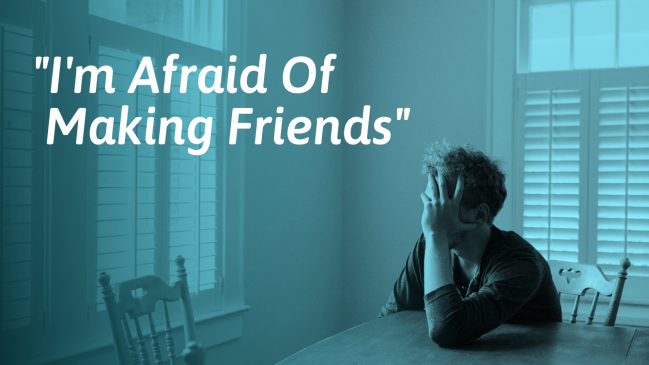“I want to have a social life, but I’m afraid to get close to people. Why am I so anxious about making friends, and what can I do about it?”
Healthy friendships are great for your mental health and wellbeing[1] but getting to know new people can be scary. If the thought of making and keeping friends makes you feel worried or overwhelmed, this guide is for you. You’ll learn about the barriers that hold you back and how to overcome them.
Sections
Why am I afraid of having friends?
1. You’re scared of being judged or rejected
When you make friends with someone, you need to let them get to know you as a person.
This means:
- Sharing your thoughts
- Sharing your feelings
- Telling them about your life
- Letting your true personality come through when you hang out with them
When you open up to someone and let them see who you really are, they might decide they don’t want to be your friend. The thought of being rejected can be frightening.
You’re more likely to worry about being judged or rejected if:
- You have an inferiority complex and tend to assume that you are “worse” or “less than” everyone else
- You have low self-confidence and can’t understand why anyone would like you
- You struggle in social situations and worry that everyone will think you are “weird” or “awkward”
2. You’re afraid that no one will understand you
If you’ve always felt like an outsider, it’s natural to wonder if you’ll ever feel a sense of connection with anyone. You might be afraid that even if you try hard to understand someone else, they won’t do the same for you.
3. You’re worried about being abandoned
If you’ve had friends or family cut you off or let you down, it’s natural to worry that the same thing will happen again. You might be reluctant to make any kind of emotional investment in people because you think, “What’s the point? Everyone leaves eventually.”
4. You’ve been bullied or abused
If other people have treated you badly or betrayed your trust, it might feel safer to avoid making friends instead of putting yourself in a position where you could get hurt again. You may find it difficult or impossible to believe that you’ll find people who will treat you well.
5. You have an insecure attachment style
When we are children, the way our parents and carers treat us affects how we see relationships. If they are reliable, affectionate, and emotionally stable, we learn that other people are mostly safe and that it’s OK to get close to them.
But if our carers weren’t reliable and didn’t make us feel safe, we can grow up thinking that other people aren’t trustworthy.[2] In psychological terms, we might develop an insecure attachment style. If you’d like to learn more about insecure attachment, this Verywell guide will help.
6. You’re worried about peoples’ expectations
You might worry that if you become friends with someone, you’ll feel obliged to hang out with them regularly even if you don’t want to see them anymore. Or if you’ve had some bad experiences with clingy people, you might worry that if you show someone that you care about them, they’ll take advantage of your kindness.
7. You’ve been in one-sided friendships
If you’ve had one-sided friendships, you might be afraid that even if you do make a new friend, you’ll have to do all the work. It can be painful to realize that someone else doesn’t value your friendship, and it’s normal to worry that you’ll end up stuck in the same pattern with future friends.
8. You have PTSD
If you’ve experienced one or more very frightening or shocking events, such as a serious assault, you might have post-traumatic stress disorder (PTSD). Common symptoms include flashbacks, bad dreams, deliberately avoiding thoughts of the event, and being easily startled. If you’d like to learn more about PTSD, the National Institute of Mental Health’s guide is a good place to start.
PTSD can make it difficult for you to relax around people. If you have it, you might often feel hypervigilant and suspicious around others. Even safe situations and people can seem threatening. Research shows that those with PTSD are unusually sensitive to signs of anger in social situations.[3] If you are often nervous or panicky in social situations, interacting with other people may not seem worth the effort.
9. You worry that other people pity you
Have you ever wondered, “Is this person my friend because they like me, or do they just feel sorry for me and want to make themselves feel better?” Or has anyone ever told you, possibly during an argument, “I’m only your friend because I feel bad for you?”
These thoughts and experiences can make you doubt other peoples’ motives, wear away your confidence, and make you reluctant to trust people.
10. You have social anxiety disorder (SAD)
SAD is a long-term condition that usually starts during a person’s teen years. The symptoms include:
-
- Feeling self-conscious in everyday social situations
- Worrying that other people will judge you
- Worrying that you’ll embarrass yourself in front of other people
- Avoiding social situations
- Panic attacks
- Physical symptoms when you’re in social situations, including blushing, sweating, and trembling
- Feeling that everyone is watching you
When left untreated, SAD can make it impossible to make friends because social situations feel so daunting.
How to overcome your fear of making friends
1. Improve your self-esteem
If you aren’t comfortable with yourself, you might be scared to make friends. You may be afraid that when they see the “real” you, they’ll decide you are unworthy of their friendship. Or you may fear that people will only befriend you out of pity.
To overcome this problem, try working on your self-esteem.
Try these strategies:
- Live in alignment with your personal values. When you let your values guide you instead of relying on other people telling you what to do, you’ll gain inner confidence.
- Own your flaws. Acknowledging your strengths and weaknesses can help you stop caring about what others think and validate yourself.
- Carry yourself like a confident person. Research shows that sitting up straight makes you feel more confident and improves your self-esteem in stressful situations.[4]
- Set yourself some ambitious yet realistic goals.[5]
- Master a new skill. Try Udemy or Coursera if you can’t attend a class in person. Pick something that gives you a sense of achievement.
- Speak to yourself with kindness and compassion. Verywell Mind has a great guide on why it’s important to overcome negative self-talk and how to challenge the critical voice in your head.
- If you think you are “less than” everyone else, read this guide on how to overcome an inferiority complex.
2. Practice basic social skills
If your basic social skills need some work, you might feel self-conscious and anxious around other people. Making friends can feel like an impossible task if you are constantly worrying that you’re making social mistakes.
It’s easy to get trapped in a cycle:
- You avoid social situations because you feel awkward and socially unskilled.
- Because you avoid socializing, you don’t get any opportunities to practice or make friends.
- Because you don’t get much practice, you feel too awkward to interact with people.
The only way to break this pattern is to learn the basic rules of social interaction and then deliberately put yourself in social situations until you start feeling more comfortable around other people.
It may help to check out our guides that will help you master key social skills:
- Making confident eye contact
- Appearing approachable and friendly
- Making small talk
- Keeping a conversation going
You can also check out this list of 35 social skills books for adults.
Challenge yourself to practice these skills by setting realistic, specific goals. For example, if you struggle to make eye contact, set a goal of making eye contact with one stranger every day for a week. As you grow more confident, you can set more ambitious targets.
3. Practice self-disclosure
Sharing your thoughts and feelings builds intimacy[6] and is an important part of friendship, but self-disclosure can feel awkward or even dangerous if you’re afraid to be vulnerable with friends.
You don’t have to reveal everything or share all your secrets straight away when you’re in the early stages of friendship. It’s a good idea to open up gradually and build trust slowly. As you get to know someone, you can talk about increasingly personal things. This approach also helps you avoid oversharing, which many people find offputting.
When you haven’t known someone very long, start by sharing noncontroversial opinions. For example:
- [In a conversation about film]: “I’ve always preferred movies over books.”
- [In a conversation about travel]: “I love family vacations, but I think solo traveling can be great too.”
When you feel ready to trust the other person, you can start opening up on a deeper level. For example:
- [In a conversation about family]:“I’m close to my siblings, but sometimes I wish they took more of an interest in my life.”
- [In a conversation about careers]:“I like my job most of the time, but part of me wants to quit and take a year off to go volunteering abroad. I think it’d be really fulfilling.”
If you struggle to put your feelings into words, work on growing your “feelings vocabulary.” You might find the feelings wheel useful.
4. Encourage people to open up
When you realize that another person has their own insecurities and vulnerabilities, it can feel easier to be open with them. Conversations don’t have to be perfectly balanced, but good conversations follow a back-and-forth pattern where both people can speak and feel heard. Our guide on how to have deep conversations contains step-by-step examples that explain how to learn more about someone while sharing in return.
5. Make peace with rejection
Making friends will always carry some level of risk. It’s impossible to predict for certain whether someone we like will want to be our friend. If you can learn to deal with rejection, you’ll probably find it easier to take social risks.
Try to reframe rejection as a positive sign. It means you are moving beyond your comfort zone and taking active steps to build new relationships.
Remember that getting rejected can also save you time. If someone turns you down, you’ll no longer have to wonder whether or not they like you. Instead, you can move on and focus on getting to know people who are a better match.
Building your self-esteem can make it easier to deal with rejection. When you know that you’re just as valuable as anyone else, rejection doesn’t feel like a complete disaster because you know it doesn’t mean that you’re “bad” or “unworthy.”
6. Create firm boundaries
When you know how to defend your boundaries, you’ll feel more confident getting close to people. If they start acting in ways that make you uncomfortable, you’ll be able to filter them out of your life. You don’t owe anyone friendship, and you don’t have to put up with toxic behaviors.
If you are afraid of making friends because you’ve accidentally chosen toxic people in the past, check out our article on the signs of a toxic friendship.
Read this article on how to get people to respect you for more advice on how to stand up for yourself. You might also like to read about how to set boundaries with friends.
7. Meet like-minded people in a safe environment
Find a regular class or meetup for people who share your interests or hobbies. Try to find one that meets every week.
Here’s why:
- You’ll know that you have something in common with everyone there, which can boost your confidence if you tend to feel like a misfit in social situations.
- Sharing an interest with someone can make it easier to start conversations.
- When you spend time with someone at a meetup or class, you can see how they treat other people. This gives you insight into their character and helps you decide whether they are someone you’d like to know better.
- Going to regular meetups lets you get to know someone over a few weeks or months in a structured way. Because you’ll be around other people, it can feel safer and less awkward than meeting up alone.
- When you get to know someone from your group, it’s natural to ask whether they’d be interested in hanging out between classes or meetups. You can do this in a low-key way. For example, you could say, “Would you be interested in grabbing a coffee with me before class next week?”
- Meeting lots of new people and building several friendships at a time can help you feel less scared of rejection. It also stops you from investing too much energy and time into one person.
Here’s how to meet like-minded people who understand you.
8. Be prepared to answer awkward questions
If you don’t have any friends, you might be anxious that people will find out and decide that you are “weird” or a loner.
If someone tries to make you feel bad for not having friends, they are best avoided. However, if you are afraid of being judged for not having a social life, you might feel more confident if you prepare what to say in advance if the topic comes up.
It’s unlikely that anyone will ask, “So, how many friends do you have?” or “What do you like doing with your friends?” But if they do ask, you can give them an answer that is honest without having to go into details. For example, depending on your circumstances, you could say:
- “I’ve kind of drifted apart from my old friends, so I’m working on my social life at the moment.”
- “I’ve been so busy with work these past few years that I haven’t had much time to socialize. But I’m trying to change that!”
9. Accept that it’s normal to lose friends
It’s natural to worry that you’ll make friends with someone only to then lose them. You may be so afraid of loss that you avoid friendships entirely.
It can help to accept that many friendships change or come to an end for many reasons.
For example:
- One of you might move away.
- One of you might start a romantic relationship or a family, which takes up a lot of time or attention.
- Your opinions, views, or lifestyles change, and you no longer have anything in common.
To overcome your fear of losing friends:
- Make a habit of meeting new people. See your social life as an ongoing project. If you have several friends, it might not feel so devastating if you drift apart from a couple of people.
- Be proactive when it comes to keeping in touch with your friends. The friendship may not last—both of you have to make an effort, and some people won’t put in the work—but if it fades, you’ll know you tried your best.
- Know that it’s possible to reconnect after months or years apart. If you used to be close to someone, there’s a good chance they might welcome the chance to revive the friendship one day. You haven’t necessarily lost them forever.
- Learn to be comfortable with change in general. Keep growing and challenging yourself as a person. Try new pastimes, pick up new skills, and dig into topics you find interesting.
10. Try therapy if you have deep-seated problems
Most people can learn how to improve their social skills and overcome a fear of making friends by themselves, but in some cases, it’s a good idea to get some professional help.
Consider finding a therapist if:
- You think you have serious attachment issues. These usually stem from childhood, and they can be difficult to overcome on your own.[7]
- You have PTSD or a history of trauma and feel very distrustful of other people.
- You have social anxiety, and self-help isn’t making a difference.
Therapy can teach you new ways of thinking about relationships and help you learn to trust other people. You can find a suitable therapist using BetterHelp or ask your doctor for a recommendation.









